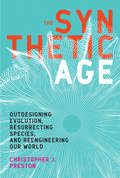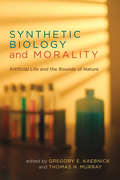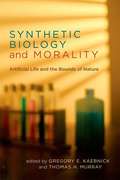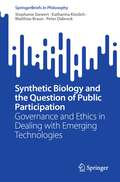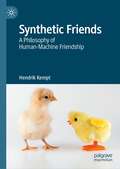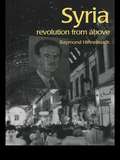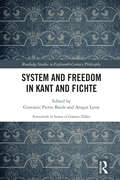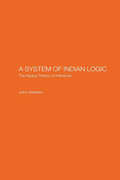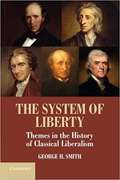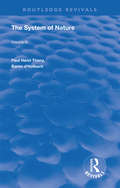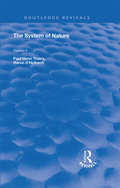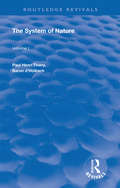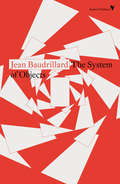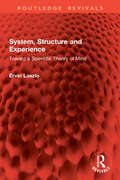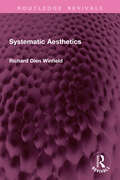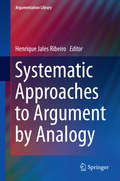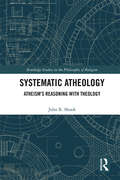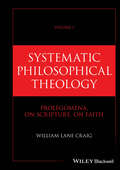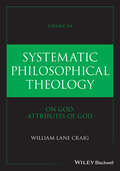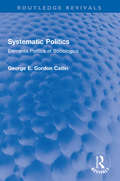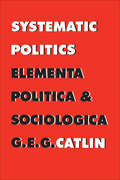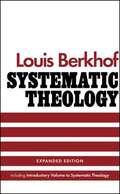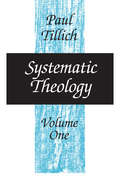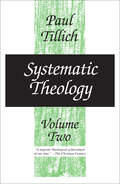- Table View
- List View
The Synthetic Age: Outdesigning Evolution, Resurrecting Species, and Reengineering Our World (The\mit Press Ser.)
by Christopher J. PrestonImagining a future in which humans fundamentally reshape the natural world using nanotechnology, synthetic biology, de-extinction, and climate engineering.We have all heard that there are no longer any places left on Earth untouched by humans. The significance of this goes beyond statistics documenting melting glaciers and shrinking species counts. It signals a new geological epoch. In The Synthetic Age, Christopher Preston argues that what is most startling about this coming epoch is not only how much impact humans have had but, more important, how much deliberate shaping they will start to do. Emerging technologies promise to give us the power to take over some of Nature's most basic operations. It is not just that we are exiting the Holocene and entering the Anthropocene; it is that we are leaving behind the time in which planetary change is just the unintended consequence of unbridled industrialism. A world designed by engineers and technicians means the birth of the planet's first Synthetic Age.Preston describes a range of technologies that will reconfigure Earth's very metabolism: nanotechnologies that can restructure natural forms of matter; “molecular manufacturing” that offers unlimited repurposing; synthetic biology's potential to build, not just read, a genome; “biological mini-machines” that can outdesign evolution; the relocation and resurrection of species; and climate engineering attempts to manage solar radiation by synthesizing a volcanic haze, cool surface temperatures by increasing the brightness of clouds, and remove carbon from the atmosphere with artificial trees that capture carbon from the breeze. What does it mean when humans shift from being caretakers of the Earth to being shapers of it? And in whom should we trust to decide the contours of our synthetic future? These questions are too important to be left to the engineers.
Synthetic Biology and Morality: Artificial Life and the Bounds of Nature (Basic Bioethics)
by Gregory E. Kaebnick Thomas H. MurrayA range of views on the morality of synthetic biology and its place in public policy and political discourse.Synthetic biology, which aims to design and build organisms that serve human needs, has potential applications that range from producing biofuels to programming human behavior. The emergence of this new form of biotechnology, however, raises a variety of ethical questions—first and foremost, whether synthetic biology is intrinsically troubling in moral terms. Is it an egregious example of scientists “playing God”? Synthetic Biology and Morality takes on this threshold ethical question, as well as others that follow, offering a range of philosophical and political perspectives on the power of synthetic biology.The contributors consider the basic question of the ethics of making new organisms, with essays that lay out the conceptual terrain and offer opposing views of the intrinsic moral concerns; discuss the possibility that synthetic organisms are inherently valuable; and address whether, and how, moral objections to synthetic biology could be relevant to policy making and political discourse. Variations of these questions have been raised before, in debates over other biotechnologies, but, as this book shows, they take on novel and illuminating form when considered in the context of synthetic biology.ContributorsJohn Basl, Mark A. Bedau, Joachim Boldt, John H. Evans, Bruce Jennings, Gregory E. Kaebnick, Ben Larson, Andrew Lustig, Jon Mandle, Thomas H. Murray, Christopher J. Preston, Ronald Sandler
Synthetic Biology and Morality: Artificial Life and the Bounds of Nature
by Gregory E. Kaebnick Thomas H. MurraySynthetic biology, which aims to design and build organisms that serve human needs, has potential applications that range from producing biofuels to programming human behavior. The emergence of this new form of biotechnology, however, raises a variety of ethical questions -- first and foremost, whether synthetic biology is intrinsically troubling in moral terms. Is it an egregious example of scientists "playing God"? "Synthetic Biology and Morality" takes on this threshold ethical question, as well as others that follow, offering a range of philosophical and political perspectives on the power of synthetic biology. The contributors consider the basic question of the ethics of making new organisms, with essays that lay out the conceptual terrain and offer opposing views of the intrinsic moral concerns; discuss the possibility that synthetic organisms are inherently valuable; and address whether, and how, moral objections to synthetic biology could be relevant to policy making and political discourse. Variations of these questions have been raised before, in debates over other biotechnologies, but, as this book shows, they take on novel and illuminating form when considered in the context of synthetic biology. ContributorsJohn Basl, Mark A. Bedau, Joachim Boldt, John H. Evans, Bruce Jennings, Gregory E. Kaebnick, Ben Larson, Andrew Lustig, Jon Mandle, Thomas H. Murray, Christopher J. Preston, Ronald Sandler
Synthetic Biology and the Question of Public Participation: Governance and Ethics in Dealing with Emerging Technologies (SpringerBriefs in Philosophy)
by Stephanie Siewert Katharina Kieslich Matthias Braun Peter DabrockThe book considers the relationship between governance and participation, and the ways participation has been understood, framed and applied in the context of synthetic biology (SB) governance approaches. Based on fundamental questions about the scope, purpose, and responsibilities assigned to public participation activities, the authors conducted an literature review of policy reports and articles on SB governance. The authors identify key characteristics of synthetic biology, such as the complex interplay of research, engineering and IT expertise in the field, as well as the challenges these characteristics pose in designing governance frameworks. Drawing on insights from a literature review, the authors contest calls for “earlier” and “more” participation on the basis that such calls fail to consider the necessary structural adjustments and resources needed for such endeavors. The brief addresses ethical questions arising in synthetic biology that could be used for developing frameworks of governance in the ongoing COVID-19 crisis and the consequent innovations in vaccine research.
Synthetic Friends: A Philosophy of Human-Machine Friendship
by Hendrik KemptThis book explores the notion of whether we can be friends with machines in a philosophically meaningful way. Depending on our concept of friendship, we may be inclined to answer differently. Since social technology has made new forms of friendships possible between people across the globe, the author argues that the philosophical concept of friendship, forged thousands of years ago, should be re-examined. The author proposes a new approach to the debate that reflects the unique relationship we can build with machines as our synthetic friends.
Syria: Revolution From Above (The Contemporary Middle East)
by Raymond HinnebuschThis study examines the development of the Syrian state as it has emerged under thirty-five years of military-Ba'thist rule and, particularly, under President Hafiz al-Asad. It analyzes the way in which the fragility of the post-independence state, unable to contain rising nationalist struggle and class conflict, opened the way to the Ba'th party's rise to power and examines how the Ba'th's 'revolution from above' transformed Syria's socio-political terrain.
System and Freedom in Kant and Fichte (Routledge Studies in Eighteenth-Century Philosophy)
by Giovanni Pietro Basile Ansgar LyssyThis book investigates various aspects of freedom as developed in the philosophical systems of Kant and Fichte. Freedom, both Kant and Fichte insist, does not mean that we can choose or think independently from all rules or necessity, but rather that we willingly accept a certain kind of submission under these rules. Therefore, the conditions of our knowledge affect and inform our self-understanding, our willing, and the ways we justify our practical choices. The essays in this volume explore both philosophers’ conceptions of human freedom as they relate to art, history, politics, and religion. They reveal how integrating freedom into a system of thought is crucial for our understanding of modern philosophy. System and Freedom in Kant and Fichte will be of interest to scholars and advanced students working on Kant, modern philosophy, and German Studies.
System and Freedom in Kant and Fichte (Routledge Studies in Eighteenth-Century Philosophy)
by Giovanni Pietro Basile Ansgar LyssyThis book investigates various aspects of freedom as developed in the philosophical systems of Kant and Fichte.Freedom, both Kant and Fichte insist, does not mean that we can choose or think independently from all rules or necessity, but rather that we willingly accept a certain kind of submission under these rules. Therefore, the conditions of our knowledge affect and inform our self-understanding, our willing, and the ways we justify our practical choices. The essays in this volume explore both philosophers’ conceptions of human freedom as they relate to art, history, politics, and religion. They reveal how integrating freedom into a system of thought is crucial for our understanding of modern philosophy.System and Freedom in Kant and Fichte will be of interest to scholars and advanced students working on Kant, modern philosophy, and German Studies.
A System of Indian Logic: The Nyana Theory of Inference
by John VattankyNyana is the most rational and logical of all the classical Indian philosophical systems. In the study of Nyana philosophy, Karikavali with its commentary Muktavali, both by Visvanatha Nyayapancanana, with the commentaries Dinakari and Ramarudri, have been of decisive significance for the last few centuries as advanced introductions to this subject. The present work concentrates on inference (anumana) in Karikavali, Muktavali and Dinakari, carefully divided into significant units according to the subject, and translates and interprets them. Its commentary makes use of the primary interpretation in Sanskrit contained especially in the Ramarudri and Subodhini. The book begins with the Sanskrit texts of Karikavali and Muktavali; followed by English translation of these texts. Next is given the Sanskrit text of Dinakari which comments on the first two texts, followed by its English translation. Lastly, the book contains a commentary on all the texts included.
The System of Liberty
by George H. SmithLiberal individualism, or "classical liberalism" as it is often called, refers to a political philosophy in which liberty plays the central role. This book demonstrates a conceptual unity within the manifestations of classical liberalism by tracing the history of several interrelated and reinforcing themes. Concepts such as order, justice, rights, and freedom have imparted unity to this diverse political ideology by integrating context and meaning. However, they have also sparked conflict, as classical liberals split on a number of issues, such as legitimate exceptions to the "presumption of liberty," the meaning of "the public good," natural rights versus utilitarianism, the role of the state in education, and the rights of resistance and revolution. This book explores these conflicts and their implications for contemporary liberal and libertarian thought.
The System of Nature: Volume III (Routledge Revivals)
by Paul Henri ThieryOriginally published in 1984. Paul Henri Thiery, Baron d'Holbach (1723-1789), was the center of the radical wing of the philosophers. Holbach wrote, translated, edited, and issued a stream of books and pamphlets, often under other names, that has made him the despair of bibliographers but has connected his name, by innuendo, gossip, and association, with most of what was written in defeense of atheistic materialism in late eighteenth-century France. Holbach is best known for The System of Nature (1770) and deservedly, since it is a clear exposition of his main ideas. His initial position determines all the rest of his argument: 'There is not, there can be nothing out of that Nature which includes all beings.' Conceiving of nature as strictly limited to matter and motion, both of which have always existed, he flatly denies that there is any such thing as spirit or supernatural. This is the third of three volumes.
The System of Nature: Volume 2 (Routledge Revivals)
by Paul Henri ThieryOriginally published in 1984. Paul Henri Thiery, Baron d'Holbach (1723-1789), was the center of the radical wing of the philosophers. Holbach wrote, translated, edited, and issued a stream of books and pamphlets, often under other names, that has made him the despair of bibliographers but has connected his name, by innuendo, gossip, and association, with most of what was written in defeense of atheistic materialism in late eighteenth-century France. Holbach is best known for The System of Nature (1770) and deservedly, since it is a clear exposition of his main ideas. His initial position determines all the rest of his argument: 'There is not, there can be nothing out of that Nature which includes all beings.' Conceiving of nature as strictly limited to matter and motion, both of which have always existed, he flatly denies that there is any such thing as spirit or supernatural. This is the second of three volumes.
The System of Nature: Volume 1 (Routledge Revivals)
by Paul Henri ThieryOriginally published in 1984. Paul Henri Thiery, Baron d'Holbach (1723-1789), was the center of the radical wing of the philosophers. Holbach wrote, translated, edited, and issued a stream of books and pamphlets, often under other names, that has made him the despair of bibliographers but has connected his name, by innuendo, gossip, and association, with most of what was written in defeense of atheistic materialism in late eighteenth-century France. Holbach is best known for The System of Nature (1770) and deservedly, since it is a clear exposition of his main ideas. His initial position determines all the rest of his argument: 'There is not, there can be nothing out of that Nature which includes all beings.' Conceiving of nature as strictly limited to matter and motion, both of which have always existed, he flatly denies that there is any such thing as spirit or supernatural. This is the first of three volumes.
The System of Objects (Latin American And Iberian Studies)
by Jean BaudrillardThe System of Objects is a tour de force—a theoretical letter-in-a-bottle tossed into the ocean in 1968, which brilliantly communicates to us all the live ideas of the day.Pressing Freudian and Saussurean categories into the service of a basically Marxist perspective, The System of Objects offers a cultural critique of the commodity in consumer society. Baudrillard classifies the everyday objects of the &“new technical order&” as functional, nonfunctional and metafunctional. He contrasts &“modern&” and &“traditional&” functional objects, subjecting home furnishing and interior design to a celebrated semiological analysis. His treatment of nonfunctional or &“marginal&” objects focuses on antiques and the psychology of collecting, while the metafunctional category extends to the useless, the aberrant and even the &“schizofunctional.&” Finally, Baudrillard deals at length with the implications of credit and advertising for the commodification of everyday life.The System of Objects is a tour de force of the materialist semiotics of the early Baudrillard, who emerges in retrospect as something of a lightning rod for all the live ideas of the day: Bataille&’s political economy of &“expenditure&” and Mauss&’s theory of the gift; Reisman&’s lonely crowd and the &“technological society&” of Jacques Ellul; the structuralism of Roland Barthes in The System of Fashion; Henri Lefebvre&’s work on the social construction of space; and last, but not least, Guy Debord&’s situationist critique of the spectacle.
System, Structure and Experience: Toward a Scientific Theory of Mind (Routledge Revivals)
by Ervin LaszloFirst Published in 1969, System, Structure and Experience offers a basic information-flow design capable of accounting for the complex operations of a culturally cognizant and purposive mind consistently with the general relationship of the human organism and its environment. By means of the isomorphy of a hierarchically ordered series of circuits, a way is opened for resolving the traditional ‘mind- body’ or ‘psycho-physical’ problems. The work outlines the design of a self-stabilizing and self-organizing system, shows that it applies to artificial, biological as well as cognitive structures, and then undertakes to analyze the diverse facets of perpetual, scientific, aesthetic, and religious experience in its terms. The interrelation of the two or more such multi-level cognitive systems offers insights into the problems of human communication.The book is a contribution to the scientific analysis of cognitive experience and promotes the transfer of the traditional domain of an introspectively founded philosophy of mind into the realm of modern system research.
Systematic Aesthetics (Routledge Revivals)
by Richard WinfieldFirst published in 1995, this book aims at rehabilitating systematic aesthetics. To this end, it attempts to show how metaphysical, transcendental, and systematic aesthetics comprise the fundamental options for the philosophy of art, how metaphysical and transcendental aesthetics internally undermine themselves, and, finally, how their dilemmas are overcome by systematic aestheticsIt discusses themes like critique of metaphysical aesthetics; impasse of transcendental aesthetics; individuality of beauty; the existence of beauty in the work of art; the extreme reality of the work of art and the reception of art. This is a must read for scholars and researchers of philosophy of art and philosophy in general.
Systematic Approaches to Argument by Analogy
by Henrique Jales RibeiroThe present volume assembles a relevant set of studies of argument by analogy, which address this topic in a systematic fashion, either from an essentially theoretical perspective or from the perspective of it being applied to different fields like politics, linguistics, literature, law, medicine, science in general and philosophy. All result from original research conducted by their authors for this publication. Thus, broadly speaking, this is an exception which we find worthy of occupying a special place in the sphere of the bibliography on the argument by analogy. In effect, most of the contexts of the publications on this topic focus on specific areas, for example everyday discourse, science or law theory, while underestimating or sometimes even ignoring other interdisciplinary scopes, as is the case of literature, medicine or philosophy. The idiosyncrasy of this volume is that the reader and the researcher may follow the development of different theoretical outlooks on argument by analogy, while measuring the scope of its (greater or lesser) application to the aforementioned areas as a whole.
Systematic Atheology: Atheism’s Reasoning with Theology (Routledge Studies in the Philosophy of Religion)
by John R. ShookAtheology is the intellectual effort to understand atheism, defend the reasonableness of unbelief, and support nonbelievers in their encounters with religion. This book presents a historical overview of the development of atheology from ancient thought to the present day. It offers in-depth examinations of four distinctive schools of atheological thought: rationalist atheology, scientific atheology, moral atheology, and civic atheology. John R. Shook shows how a familiarity with atheology’s complex histories, forms, and strategies illuminates the contentious features of today’s atheist and secularist movements, which are just as capable of contesting each other as opposing religion. The result is a book that provides a disciplined and philosophically rigorous examination of atheism’s intellectual strategies for reasoning with theology. Systematic Atheology is an important contribution to the philosophy of religion, religious studies, secular studies, and the sociology and psychology of nonreligion.
Systematic Philosophical Theology, Volume 1: Prolegomena, On Scripture, On Faith
by William Lane Craig“the culmination of an impressive career in philosophy and theology. … Craig’s work will be highly valued and a great achievement, meriting significant attention.” —Charles Taliaferro, Professor Emeritus of Philosophy, St. Olaf College “William Lane Craig’s landmark treatise on systematic philosophical theology is a major contribution to our understanding of the relation of philosophy and Christian doctrine and will be an essential reference point for future discussions. —Alister McGrath, Emeritus Idreos Professor of Science and Religion, Oxford University A transformative journey through Christian doctrine, Volume I: On Scripture, On Faith William Lane Craig’s Systematic Philosophical Theology is a multi-volume explication of Christian doctrine in the classic Protestant tradition of the loci communes as seen through the lens of contemporary analytic philosophy. Uniquely blending the disciplines of biblical theology, historical theology, and analytic theology, these volumes aim to provide readers with a biblical and philosophically coherent articulation of a wide range of Christian doctrines. In the first volume of the series, Prolegomena, On Scripture, On Faith, Craig begins by introducing his conception of systematic philosophical theology, describing how it relates to biblical theology, dogmatics, fundamental theology, apologetics, and especially philosophy of religion. The chapters that follow defend the divine authority of Scripture, address the nature of faith, and discuss the rational justification for Christian faith. Throughout the text, Craig tackles cutting edge philosophical questions that arise naturally from Christian doctrine, such as the compatibility of biblical inspiration and human freedom and whether faith implies belief.
Systematic Philosophical Theology, Volume 2a: On God - Attributes of God
by William Lane Craig“These volumes are chock full of arguments in a way that stands out in this field. . . . This is a remarkable, generational work that will become the resource in philosophical theology.” —J.P. Moreland, Distinguished Professor of Philosophy, Biola University “An enormous undertaking. However, Craig’s past record indicates that he can and will carry it through to completion. Furthermore, his established reputation. . . guarantees that the work will attract wide interest and will have a ready readership.” —William Hasker, Emeritus Professor of Philosophy, Huntington University A transformative journey through Christian doctrine, Volume IIa. On God: Attributes of God William Lane Craig’s Systematic Philosophical Theology is a multi-volume explication of Christian doctrine in the classic Protestant tradition of the loci communes as seen through the lens of contemporary analytic philosophy. Uniquely blending the disciplines of biblical theology, historical theology, and analytic theology, these volumes aim to provide readers with a biblical and philosophically coherent articulation of a wide range of Christian doctrines. Volume II treats the locus On God in two parts. The first part, Volume IIa. Attributes of God, explores the coherence of theism. Conceiving of God as an infinite and personal being of maximal greatness, Craig carefully defines and explicates the divine attributes of incorporeality, necessity, aseity, simplicity, eternality, omnipresence, omniscience, omnipotence, and goodness. In the second part, Volume IIb. Excursus on Natural theology, The Trinity, Craig examines six arguments for God’s existence, including the argument from contingency, the kalām cosmological argument, the argument from the applicability of mathematics, the argument from cosmic fine-tuning, the moral argument, and the ontological argument, along with the problem of evil. Following the excursus, he transitions to an articulation and defence of Christian theism, formulating a biblical doctrine of the Trinity and offering a model of God as a tripersonal soul.
Systematic Politics: Elementa Politica et Sociologica (Routledge Revivals)
by George E. CatlinFirst published in 1962, Systematic Politics presents Catlin’s political theories and reviews the work of contemporaries within the field. Divided into two parts, Part One is focused on political science and explores areas such as definitions and functions, the theory of politics as hypothesis, freedom and authority, and different forms of government. Part Two centres on political philosophy, discussing topics such as community, society and the individual, and law and sovereignty. Systematic Politics will appeal to those with an interest in the history of political thought, political theory, and political philosophy.
Systematic Politics: Elementa Politica and Sociologica
by George E. Gordon CatlinProfessor Catlin in the course of his career has contributed a number of major works in the fields of politics: The Science and Method of Politics (1926), Principles of Politics (1930), History of the Political Philosophers (1938). These books were considered "refreshing," "brilliant," "eminently stimulating," "genuinely constructive." The trail blazed by their author some thirty years ago through the forest of "unscientific" political thinking has since been followed by many others and has widened into one of the main highways of twentieth-century political though.The new approach of Professor Catlin was notable because it distinguished between political philosophy, with its values and ends, and the scientific study of means; it broke away from older studies and broadened the concept of Politics, in an Aristotelian sense; it bridged the divorce between Politics and Sociology; it stressed the quantitative method; it pioneered in the "power theory of politics," as a key hypothesis in building; and it developed the theories of equilibrium and of the political market, with its pressure groups. No political science can be formulated today which ignores his arguments on these topics.In this new work, Professor Catlin goes back to cover the developments of thirty years, integrating the work of his contemporary colleagues and relating it to the broad tradition of Western philosophy. The range of the book over time and topics is exhilaratingly wide; its content is often intellectually intoxicating. Many will appreciate the clear insight and understanding that the book lends of so much in life–not just in the fields traditionally assigned to political thinkers; others may be provoked by the author's strong argumentative sense. No one will deny the vigour and relevance of the discussion. This summational work is important and practical at a time when the political endeavours of man are more than ever in need of thoroughly rigorous logical analysis.
Systematic Theology
by Louis BerkhofLouis Berkhof's loyalty to the well-defined lines of the Reformed faith, his concise and compact style and his up-to date treatment have made this work the most important twentieth century compendium of Reformed theology. 'The work seemed particularly important to me', writes the author, 'in view of the widespread doctrinal indifference of the present day, of the resulting superficiality and confusion in the minds of many professing Christians, of the insidious errors that are zealously propagated even from the pulpits, and of the alarming increase of all kinds of sects. If there ever was a time when the church ought to guard her precious heritage, the deposit of the truth that was entrusted to her care, that time is now'. This expanded edition contains Berkhof's Introductory Volume, which was designed to be read together with the Systematic Theology itself.
Systematic Theology
by Paul Tillich&“A great voyage of discovery into a rich and deep, and inclusive...vision and understanding of human life in the presence of the mystery of God.&” -- H. Richard Niebuhr, author of Christ and Culture This is the first part of Paul Tillich's three-volume Systematic Theology, one of the most profound statements of the Christian message ever composed and the summation and definitive presentation of the theology of the most influential and creative American theologian of the twentieth century. In this path-breaking volume Tillich presents the basic method and statement of his system—his famous &“correlation&” of man's deepest questions with theological answers. Here the focus is on the concepts of being and reason. Tillich shows how the quest for revelation is integral to reason itself. In the same way a description of the inner tensions of being leads to the recognition that the quest for God is implied in finite being. Here also Tillich defines his thought in relation to philosophy and the Bible and sets forth his famous doctrine of God as the &“Ground of Being.&” Thus God is understood not as a being existing beside other beings, but as being-itself or the power of being in everything. God cannot be made into an object; religious knowledge is, therefore, necessarily symbolic. &“Beyond doubt the richest, most suggestive, and most challenging philosophical theology our day has produced.&” --John Herman Randall Jr., author of The Making of the Modern Mind
Systematic Theology: Volume Two
by Paul TillichThe second volume of the eminent Christian philosopher’s magnum opus, in which he explores humanity’s quest for Christ.Paul Tillich’s Systemic Philosophy is the most comprehensive and definitive presentation of his groundbreaking theological message: his “method of correlation”, which finds the answers to humanity’s most urgent existential dilemmas in the principles of Christian revelation. In volume two of this three-volume work, Tillich comes to grips with the central idea of his system—the doctrine of the Christ. Here, Tillich describes the human predicament as the state of “estrangement” from ourselves, from our world, and from the divine Ground of Being. This situation drives us to the quest for a new state of things, in which reconciliation and reunion conquer estrangement. This is the quest for the Christ.
